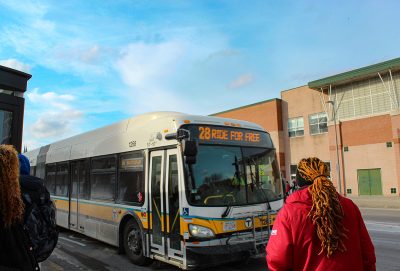
Starting March 1, bus riders boarding routes 23, 28 and 29 will do so free of charge.
Following the successful pilot program on Route 28, Mayor Michelle Wu announced the extension of the fare-free program to apply to two additional routes for two years, adding that it will meet the city’s “climate justice goals.”
“Expanding fare-free transit to Routes 23, 28, 29 will better connect our communities, increase ridership, and ease congestion for all our residents,” Wu said in a Feb. 9 press conference.
All three lines go through Blue Hill Avenue, which has been identified by the Livable Streets Alliance as a diverse sector of Boston that should be prioritized in order to boost ridership and reliability for the area.
In the fare-free pilot program, Route 28 saw a 90% increase in ridership compared to pre-pandemic levels, according to a press release.
“It’s providing more access and more opportunity for more people, and probably largely people who couldn’t afford a bus trip,” said James Aloisi, a lecturer at the MIT department of urban studies and planning.
Collique Williams, committee organizer for Public Transit Public Good and Community Labor United, said the City’s move is “a great first step” and urged the MBTA to assist low-income individuals.
“Riding the MBTA is, for some folks, a financial choice,” Williams said. “They’ve had to make choices in terms of, ‘Do I get to go to the doctor’s office?’ or, ‘Do I only have enough money to go to work or to pick up the kids?’”
Aloisi said improving access to free transportation is economic and social justice, but not “so much climate justice.”
“Providing more people with that access and opportunity also provides people with the chance to connect to the places that they and others need to get to,” he said. “So it makes our community stronger by connecting and it makes our people stronger and more resilient by giving them more opportunities every day.”
Aloisi added Roxbury, Dorchester, East Boston and other neighborhoods in Boston are areas where climate justice is a concern.
“Those are all places where we need to focus on things Mayor Wu has done, making bus transit free, encouraging more ridership,” Aloisi said. “The MBTA, the transit system, plays a very large role in offering people options to driving or options to being driven and a role that will help make modest but significant reductions in emissions in the short term.”
He added one way to reduce carbon emissions is to “reimagine and redesign” streetscape — such as improving cycling lanes, cycling lights, dedicated bus lanes and carbon tax on home deliveries.
Williams said the City can now begin down the path of achieving climate justice.
“Transportation justice and climate justice go hand in hand, we are about the business of moving people safely, equitably and affordably, and with a minimum impact that we can to the environment,” Williams said.




















































































































